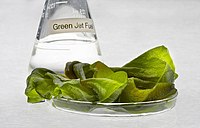
Photo from wikipedia
Poly(3-hydroxybutyrate) (PHB)—a renewable and biodegradable polymer—is a promising alternative to nonbiodegradable synthetic plastics that are derived from petrochemicals. The methods currently employed for PHB production are costly, in part, due… Click to show full abstract
Poly(3-hydroxybutyrate) (PHB)—a renewable and biodegradable polymer—is a promising alternative to nonbiodegradable synthetic plastics that are derived from petrochemicals. The methods currently employed for PHB production are costly, in part, due to the expensive cultivation feedstocks and the need to sterilize the culture medium, which is energy-intensive. This study investigates the feasibility of nonsterile PHB production from several saline organic wastes using a salt-tolerant strain, Zobellella denitrificans ZD1 (referred to as strain ZD1). Factors such as the pH, salinity, carbon/nitrogen (C/N) ratio, nitrogen source, and electron acceptor that might affect the growth of strain ZD1 and its PHB production were determined. Our results showed successful nonsterile PHB production by growing the strain ZD1 on nonsterile synthetic crude glycerol, high-strength saline wastewater, and real municipal wastewater-activated sludge under saline conditions. The PHB production was significantly enhanced when the levels of salts and nitrate-nitrogen in the culture medium were increased. This study suggested a promising low-cost nonsterile PHB production strategy from organic wastes using strain ZD1.
Journal Title: ACS Omega
Year Published: 2020
Link to full text (if available)
Share on Social Media: Sign Up to like & get
recommendations!